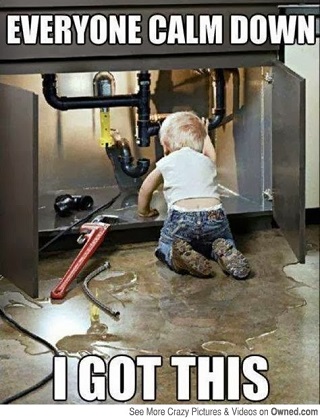From Guest Blogger Lizzie Weakly: How Bad Plumbing Can Affect Your Home Efficiency in the Winter

Understanding Water
Water has a significant freezing point, and harsh winters can cause the water within your plumbing to freeze when the temperature drops low enough. Of course, most of the water within the pipes should be protected, but that can only happen if it is not exposed to the elements.
Another thing that is common during the winter is the consumption of water. The winter generally sees a rise in water consumption at home. This happens because children and parents are usually off during the winter, meaning that they are home more often. The consumption of water puts added pressure on the pipes within the home and increases the risk of a pipe bursting.
Frozen water also makes your water heater work harder than it needs to, increasing the bills.
How Freezing Temperatures Affect Bad Plumbing
Water that drops below freezing point may freeze within the pipes or faucet, especially if these areas are exposed to the elements. According to Piece of Mind Plumbing, a plumbing repair company in Colleyville, frozen water expands within the pipe, which means that there will be added pressure within it. This does not automatically mean that you will need repairs, but it is possible, especially with bad plumbing.
The expansion of the water could expand enough to cause the pipes to explode if they are not well taken care of. It should be noted that the expansion of water could also silently damage the integrity of the piping should they be in better condition, but this still means they could break next winter. Keep in mind that a burst pipe could lead to mold or foundational issues. Be sure to have the number of a trusted plumber with decades of experience that can be reached at any time just in case.
Good Plumbing can Reverse These Issues
There are a number of things that you can do to protect your home from the issues of bad plumbing and the cold season.
One thing that might work is insulating any exposed pipes. Your plumber will inspect all pipes to see if any need insulation. This will ensure that the water stays above freezing temperature.
Another good idea is to make sure that the interior is warm enough to keep the pipes from getting too cool. This means that your home should be warmer than 55 degrees, meaning that all you have to do is ensure that the heater is working properly. It is a good idea to open up the cabinets and any other access point to the plumbing just to make sure the pipes get warm enough.
A plumber can simply place freeze-proof taps on any exposed faucet, which should help prevent freezing, too.
Hopefully, these suggestions help you understand how the winter can affect the overall efficiency of your home.

My one experience with -45F weather made me very much aware of the problems of freezing pipes. Because the house my parents were temporarily renting was not properly winterized, there were many problems.
In places where the temperature drops well below freezing, to the extent possible, pipes carrying water should not be in outside walls. A possible exception would be well-insulated pipes carrying hot water to radiators or otherwise used for heating the building. There are special hose bibs (outside faucets used to connect to garden hoses (hose pipes for the Brits)) designed for use in freezing climates. The actual point at which the water is turned off is well back from the outside surface of the outside wall to prevent freezing. However, if a hose or something else keeps the hose bib from draining, destructive freezing can still occur.
There are electric heating cables which can be wound around pipes to prevent freezing, but careful design of the plumbing is better. Once a house is built it is much more difficult to correct problems which could permit freezing.
There are devices designed to turn on a lamp if the inside temperature drops too low. These are useful to notify neighbors of a problem when no one is home thereby making it possible for the neighbors to take agreed upon action.